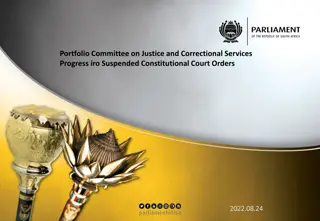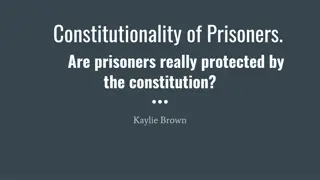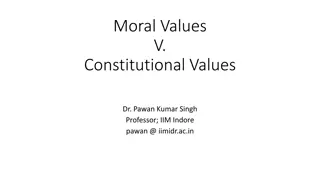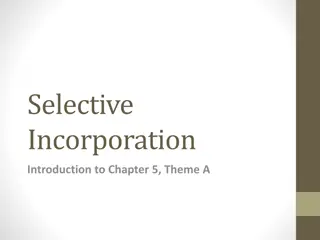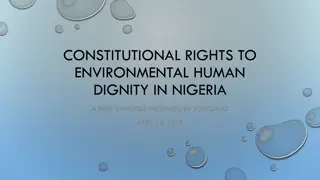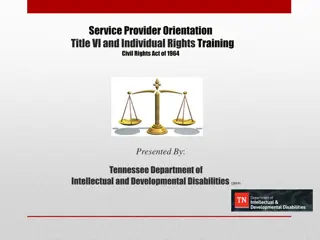Constitutional Framework for Protecting Workers' Rights
The Indian Constitution lays a strong foundation for ensuring justice, social, economic, and political balance, and protects the rights and welfare of workers. It emphasizes equality, liberty, and fraternity, guiding the creation and interpretation of labor and social legislations towards empowering the working classes. Industrial laws aim to safeguard workers, foster good employee-employer relationships, enhance worker welfare, and resolve industrial disputes within this constitutional framework.
Download Presentation

Please find below an Image/Link to download the presentation.
The content on the website is provided AS IS for your information and personal use only. It may not be sold, licensed, or shared on other websites without obtaining consent from the author. Download presentation by click this link. If you encounter any issues during the download, it is possible that the publisher has removed the file from their server.
E N D
Presentation Transcript
The founding fathers of the Constitution aware of the reality of life-wisely engrafted the Foundational Rights and Directive Principles by securing and protecting as effectively as it may, a social order in which justice, social, economic and political shall inform all the institutions of the national life and to minimise the inequalities in income and effort to eliminate inequalities in status, facilities and opportunities, not only amongst individuals but also amongst groups of people residing in different areas and engaged in different vocations. '
The preamble of the Constitution, inter alia, seeks to provide: Justice, Social, Economic and Political 1. 2. Liberty of thought, expression, belief, faith and worship 3. Equality of status and of opportunity, 4. Fraternity, assuring the dignity of the individual and unity and integrity of nation.
Constitution provide the bedrock for framing all labour and social legislation and their progressive and creative interpretation in favour of working classes. These principles run through our labour legislations like invisible golden threads and provide them strength and stamina to meet the aspirations of working classes; whether it is protective legislations, social security legislations, welfare legislations or even industrial relations legislations, they all heavily lean towards working classes due to the philosophy provided in the preamble.
OBJECTIVES OF INDUSTRIAL LAW To safeguard the workers against exploitation. To maintain good relationship between employees and employers. To provide and improve the welfare, amenities of workers. To settle industrial disputes.
THE CONSTITUTIONALFRAMEWORK: Indian Constitution provides an overarching framework for regulation of conditions of work as well as protection and promotion of livelihoods of migrant labour under chapter III (Fundamental Rights) and chapter IV (Directive Principles of State Policy). Fundamental Rights: The Fundamental Rights guaranteed by the Constitution provides equality before law; abolish discrimination and exploitation of labour whether of organized or unorganized sector. untouchability and prohibits
Article 14 declares that the State shall not deny to any person equality before the law or the equal protection of the lawswithin the territoryof India . Thus, Article 14 uses two expressions equality before the law and equal protection of the law . Both these expressions aim at establishing what is called equalityof Status in the preamble of the Constitution. Article 14 of the Constitution denote that the guarantee of the equal protection of laws is available to any person, which includes any company or association or body of individuals. Thus equality before law is guaranteed to all includes migrant labourworking in an unorganized sector
Article discrimination. discriminating against citizens on grounds only of religion, race, sex, caste, and placeof birth orany of them. 15 of the Indian Constitution prohibits the State from prohibits Clause (1) The expression discriminate against , according to the Concise Oxford Dictionary, means select for unfavourable treatment . This unfavourable treatment is the basic problem of migrant labour working in an unorganized sector. Thus, the protection provided under Article 15 is available to migrant labour
Article 17 of the Indian Constitution abolishes Untouchability which is an inherent problem of migrant labour working in an unorganized sector. Article 21 of the Constitution says that: No person shall be deprived of his life or personal liberty except according to procedure established by law. Right to life, conferred under this Article is wide and far reaching. Right to live with human dignity, right to livelihood, right to shelter, right to health and medical assistance, etc. This decision of the SC has heralded a new legal revolution. It has clothed millions of workers in factories, fields, mines and projects sites with human dignity. They had fundamental right to maximum wages, drinking waters, shelter cr ches, medical aid and safety in the respective occupations covered by the various welfare legislations.
Article 23 Article 23 prohibits the system of bonded labour because it is a form of forced labour within the meaning of this Article. Article 24 of the Constitution prohibits employment of children below 14 years of age in factories and hazardous employment. This provision is certainly in the interest of public health and safety of life of children.
Directive Principles of State Policy: The Directive Principles of the Constitution in Part IV lay down goal posts and the direction of State policy. The Directive Principles in our Constitution every person and all people are entitled to participate in, contribute to and enjoy economic, social, cultural and political development in which all human rights, fundamental freedoms would be fully realised. It is responsibility of the State as well as the individual, singly and collectively, for the development taking into account the need for fuller responsibility for the human rights, fundamental freedoms as well as the duties to the community which alone can ensure free and complete fulfilment of the human being.
The State should provide facilities and opportunities to ensure development and to eliminate all obstacles to development by appropriate economic and social reforms so as to eradicate all social injustice. Article 38 34 contains the concept of social justice which is essential for the promotion and welfare of migrant labour working in an unorganized sector. The concept of Social justice consists of diverse principles essential for the orderly growth and development of personality of every citizen. The aim of social justice is to attain substantial degree of social, economic and political equality which is the legitimate expectation and constitutional goal. In a developing society like ours, where there is vast gap of inequality in status and of opportunity, law is a catalyst, Rubicon to the poor etc. to reach the ladder of social justice. The Constitution, therefore, mandates the State to accord justice to all members of the society in all facets of human activity.
Article 39 deals with certain principles to be followed by the state while enacting any law. Clause (d) of Article 39 consist the principle of equal pay for equal work for both men and women. In pursuant to this clause, Parliament has enacted the Equal Remuneration Act, 1976. The principles of Equal pay for equal work though not a fundamental right is certainly a constitutional goal The Directive Principle also states that The State shall within the limits of its economic capacity and development, make effective provision for securing the right to work, for just and human conditions of work and maternity relief. Laws such as the Minimum Wages Act, 1948, the Maternity Benefit Act, 1961 and the Employee s Compensation Act, 1923 etc. implement this provision.
CENTRAL LAWS Central laws, which regulate the conditions of work in the unorganized sector fall into three groups. These are: Laws which apply to all sections of the Unorganized Sector labour: The Equal Remuneration Act, 1976: - To give effect to this constitutional provision, Parliament passed this Equal Remuneration Act in 1976, which provides for the payment of equal remuneration to men and women workers and for the prevention of discrimination, on the ground of sex, against women in matters of employment.
The Bonded Labour System (Abolition) Act, 1976: Indian law as well as International law prohibit the use of bonded labour. India is obliged to prohibit all forms of slavery including debt bondage, child servitude and forced labour, as well as to affirmatively protect children from economic exploitation and hazardous. However, there still exists in different parts of the country a system of usury under which the debtor or his descendants or dependants have to work for the creditor without reasonable wages or with no wages in order to extinguish the debt. In pursuance of the Article 23 of the Constitution of India the Bonded Labour System has been abolished and declared illegal by enacting the Bonded Labour System (Abolition) Act, 1976.
The Unorganized Workers Social Security Act, 2008: The role of unorganized labour in providing various products to meet out the basic necessaries of life has not been less significant than the organized sector. It is another matter that they had lesser bargaining power and thus have been subject to exploitation. They could not get appropriate price of their untiring labour invested in industrial process. It was the need of the day to provide to them coverage and the protection of the umbrella of the social security as enshrined in the Directives laid down in the Constitution of India. In order to ensure the well-being of unorganized workers, the Unorganized Workers Social Security Bill, 2007 was passed by both the houses of parliament which received the president s assent on December 30, 2008 and has been brought into force on May 05, 2009 as the Unorganized Workers Social Security Act, 2008.
The Street Vendors (Protection of Livelihood and Regulation of Street Vending) Act, 2014: In order to provide social security and protection of right to workers, whether migrant or not, of unorganized sector, the Street Vendors (Protection of Livelihood and Regulation of Street Vending) Act, 2014 is another important legislation in the Indian labour legislation history. The Act aimed to protect the rights of urban street vendors and to regulate street vending activities. The Bill was passed in the Lok Sabha on September 06, 2013 and by the Rajya Sabha on February 19, 2014. The Bill received the assent of the president of India on March 4, 2014.
Laws which are applicable only to a particular employment of the unorganized sector are as follow: The Trade Unions Act, 1926: Trade union is a voluntary organization of workers pertaining to a particular trade, industry or a company and formed to promote and protect their interests and welfare by collective action. They are the most suitable organisation for balancing and improving the relations between the employer and the employees. They are formed not only to cater to the worker s demand, but also inculcating in them the sense of discipline and responsibility. They aim to secure fair wages for workers and improve their opportunities for promotion and training; safeguard security of tenure and improve their conditions of service; improve working and living conditions of workers; provide them education, cultural and recreational facilities; and promote individual and collective welfare.
The Minimum Wages Act, 1948: The Constitution of India envisages a just and humane society and accordingly acknowledges the concept of living wage in the Directive Principles of State Policy. Even though there is not uniform and comprehensive wage policy for all sector of the economy in India, mechanism exists for determination of wages in the organized sector and unorganized sector and their enforcement. Wages in organized sector are determined through negotiations and settlements between employers and employees. In unorganized sector, where labour is vulnerable to exploitation due to illiteracy and having no effective bargaining power, minimum rates of wages are fixed both by the Central and State Governments in the scheduled employment falling within their respective jurisdiction under the provisions of the Minimum Wages Act, 1948
The Inter-State Migrant Workmen (Regulation of Employment and Conditions of Service) Act, 1979: The vast majority of migrant workers fall in the unorganized sector. Workers are recruited from various parts of a State through contractors or agents commonly known as sardars , generally for work outside the State wherever construction projects are available. This system lends itself to various abuses. The promises that contractors make at the time of recruitment about higher wages and regular and timely payments are not usually kept. No working hours are fixed for these workers and they have to work all days in the week under extremely bad, often intolerable working conditions in inhospitable environments. The provisions of various labour laws are not observed, and migrant workers are often subjected to various forms of malpractices.
The Dangerous Machines (Regulation) Act, 1983: The Act provide for the regulation of trade and commerce in, and production, supply, distribution and use of, the product of any industry producing dangerous machines with a view to securing the welfare of labour operating any such machine and for payment of compensation for the death or bodily injury suffered by any labourer while operating any such machine. It defines dangerous machine as a power thresher, and includes any such machine intended to be used in the agricultural or rural sector as the Central Government, being of opinion that it is of such a nature that any accident in the course of operation thereof is likely to cause to its operator death, dismemberment of any limb or other bodily injury, may, by notification in the Official Gazette, specify as dangerous machines.
The Child Labour (Prohibition and Regulation) Act, 1986: There are a number of enactments which prohibit the employment of children below 14 years and 15 years of age in certain specified employments. However, there is no procedure laid down in any law for deciding in which employments, occupations or processes the employment of children should be banned. There is also no law to regulate the working conditions of children in most of the employments where they are not prohibited from working and are working under exploitative conditions. Therefore the Child Labour (Prohibition and Regulation) Act, 1986 has been enacted to prohibit the engagement of children in certain employments and to regulate the conditions of work of children in certain employments and to regulate the conditions of work of children in certain other employments.
The Employees Compensation Act, 1923: The Act is applicable to employees and provides for the payment of compensation to the workmen and their dependents in the case of injury by industrial accident including certain occupational diseases arising out of and in the course of employment resulting in death or disablement. The Act applies to certain persons employed in hazardous employments such as factories, mines, plantations mechanically propelled vehicles, construction work, etc., specified in Schedule II of the Act.
The Payment of Wages Act, 1936: The general purpose of the Act is to provide that the employed persons shall be paid their wages in a particular form and at regular intervals and without any unauthorized deductions. In this way the objects of this Act threefold: (a) It provides that the employed persons shall be paid their wages in a particular form; (b) the payments will be made at regular intervals; and (c) it prohibits unlawful and unauthorized deductions from the wages.
The Employees State Insurance Act, 1948: The Employees State Insurance Act was first of such measures adopted in India to provide for social insurance to labourers. The Act aims at bringing about social and economic justice to the poor labour class of the land. But it is to be noted that the Act in the first instance applies to all factories belonging to the Government other than seasonal factories. This provision generally makes it clear that the Act applies mainly to organized sector and devoid the unorganized sector at all.
The Employees Provident Funds And Miscellaneous Provisions Act, 1952: The object of the Employees Provident Funds Act is to provide for the institution of provident funds, pension funds and deposit linked insurance funds for employees in factories and other establishment. Thus, the object makes it clear that the Act does not cover unorganized sector. However, Employees Provident Funds (Amendment) Act, 1956 empowered the Government to extend the Act to non-factory establishments.
THE MATERNITY BENEFIT ACT, 1961: The Maternity Benefit Act, 1961 was enacted to regulate the employment of women in certain establishments. It is solely devoted to working women making provisions to provide different kinds of benefits to female wage-earner. The Act is applicable to the women workers and seeks to regulate employment of women in certain establishments for certain periods before and after childbirth and provides for maternity and certain other benefits. It applies to every establishment, being a factory, mine or plantation including any such establishment belonging to Government.














